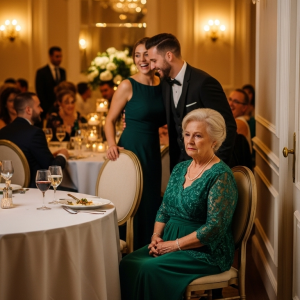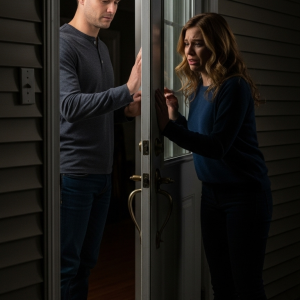My name is Tyler Williams. I’m 29, I work in construction management, and I earned every dollar I’ve ever made. My sister, Ashley, is 26, and she’s what you might call a professional girlfriend. She bounces between men who fund her lifestyle while she posts Instagram photos captioned “Entrepreneur. Blessed.” She has never worked a real job in her life. Our family dynamic has always been simple: Ashley has dreams, and I am expected to pay for them.
She has been engaged four times. Four different guys, four different rings, and four different sets of events I ended up funding. An engagement party here, a “pre-wedding event” there. Each time, she would come to me crying about how “this was the one” and how she just needed a little help. Each time, I believed her.
This last engagement was different. She was marrying Connor, a finance guy whose family has real money. Ashley thought she’d hit the jackpot and began planning a wedding of spectacular, Pinterest-fueled excess. The problem started immediately. Connor’s family set a generous budget of $40,000. For Ashley, this was practically poverty.
She called me, sobbing. “Tyler, you don’t understand,” she cried. “This is the most important day of my life. I can’t get married in some cheap community center like a peasant. You’re the only one who really gets me. You understand I deserve beautiful things.”
Like a fool, I started helping. First, it was $1,000 for dress alterations. Then $2,000 for “upgraded” flowers. Then $5,000 for a better photographer. Each time, Ashley would post on Instagram about how #blessed she was, never once mentioning where the money was actually coming from. The big hit came with the venue. The place she wanted required an $18,000 deposit upfront. Connor’s family refused. Ashley called me at work, completely hysterical. “My entire wedding is ruined! They’re being so unreasonable and cheap! You’re the only one who really cares about my happiness.” I paid the deposit. Eighteen thousand dollars, gone from my savings account—the money I’d been putting away for a down payment on my own house. Over the course of six months, my contributions totaled $47,000. But Ashley kept telling me I was her hero and that I’d be paid back. Spoiler alert: she was lying.
Last Tuesday, I got a text from my mom. “Emergency family meeting tonight. Your presence is required.” I should have known it was an ambush.
I showed up at my mom and stepdad Rick’s place, still covered in drywall dust. Ashley and Connor were there, sitting at the kitchen table like a tribunal. “Tyler, sit down,” Mom said in that fake-sweet voice she uses when she wants something. Ashley spoke first. “Connor and I have been talking, and we’ve decided that maybe having you at the wedding isn’t the best idea.”
I just stared at her. “What does that mean?” Connor cleared his throat, adjusting his polo shirt. “Tyler, we appreciate your help, but Ashley has been expressing some concerns about certain behavioral patterns you’ve been exhibiting.” “My behavioral patterns?” “You’ve been acting really possessive,” Ashley jumped in. “Calling the vendors, checking up on things constantly. It’s my wedding, not yours.” I couldn’t believe it. “I was checking on things because I paid for them.” “See!” she said, gesturing at me triumphantly. “This is what I’m talking about. You’re being super aggressive.” My mom nodded along. “We’re all worried you might cause a scene at the reception. You know how you get.”
I looked around the table at these people, sitting in a home I had helped them keep afloat, telling me I wasn’t welcome at a wedding I had almost single-handedly funded. “Let me get this straight,” I said slowly. “You don’t want me at the wedding, but you still want me to pay for everything?” Dead silence. Then Ashley looked at me, her eyes cold. “The money was a gift, Tyler. You can’t just take back a gift because you’re having hurt feelings.” Connor stood up, the picture of condescending authority. “Look, Tyler, I think you need to calm down. You’re proving Ashley’s point about your emotional instability.” That’s when something inside me snapped. I stood up, and Connor, who looks like a strong breeze would knock him over, actually took a step back. “Enjoy your wedding, Ashley,” I said, my voice dangerously quiet. “I hope it’s everything you dreamed of.” I walked out, my phone buzzing with calls I had no intention of answering. They didn’t see me as family. They saw me as a resource to be used and then discarded. If they wanted to treat me like a vendor, I was about to start acting like one.
The next morning, I started digging. I’m organized with money; it’s part of my job. I went through every receipt and payment record for the wedding. The discoveries made me sick. The $5,000 for “upgraded flowers” was actually $1,200 for flowers and a $3,800 spa weekend for her and her bridesmaids. The $8,000 for catering was $3,000 for food and a $5,000 designer handbag she flaunted on Instagram. She had been systematically stealing from me for months.
Then I found the smoking gun. A cousin had shown me Ashley’s private Instagram, “Ashley’s Perfect Wedding,” months ago. I scrolled back and found a post from three weeks earlier. It was a photo of her getting a massage. The caption read: “Wedding stress is so real! But thank God for my sweet brother who always takes care of me. Some people are just born to be providers, and others are born to be provided for. He literally pays for everything so I don’t have to worry about money at all. #blessed #spoiled”
The comments were even worse. A friend wrote: “omg you’re so lucky I wish my brother was rich” Ashley replied: “He’s not rich lol he just doesn’t have a life so he has tons of money to spend on me. it’s actually kind of sad but it totally works out for me 😂” Another friend asked: “will he pay for your honeymoon too?” Ashley replied: “Already got him to cover the flights and hotel. I just have to cry a little and he opens his wallet every time. It’s like having a personal ATM that thinks it’s your brother.”
I sat there, reading the words over and over. I wasn’t her brother. I was her mark. Her personal ATM machine. That afternoon, I drove to the wedding venue. I spoke with the manager and asked to see the contract. There it was, in black and white: my name was listed as the primary responsible party for all payments. Ashley wasn’t even mentioned. “What would happen if I decided to cancel?” I asked casually. “Well, this close to the event, we’d have to keep the deposit,” he explained. “But we could refund about 60% of your total payments.” He also confirmed that if the final payment of $22,000 wasn’t made on time, the event would be automatically cancelled.
On the drive home, Ashley called. “Tyler, I’m so glad you answered! Listen, we overreacted. You can totally come to the wedding. But you need to promise not to make any speeches or talk to Connor’s parents too much. It’s an image thing. Also, we’re going to need that final $22,000 payment for the venue by Friday. Can you handle that?” After everything. After the insults, the lies, the theft, she still had the audacity to ask for more. “Ashley,” I said, as calmly as I could manage. “Go to heck.” I hung up and immediately blocked her number. Then I called the venue back. “I’d like to cancel the Ashley Mitchell wedding,” I told the manager. “I will not be paying for it anymore.” “I understand completely, Mr. Williams,” he said. And just like that, it was done.
Next, I logged into my online banking and began a systematic dismantling of Ashley’s entire financial life, all of which, I now realized, was funded by me. I cancelled her car payment. I stopped paying her credit card bills. I cut off her gym membership and her phone bill. Then I remembered the $10,000 legal retainer I had put in my name for her a year ago after a car accident. The case had settled, but $7,200 of my money was still sitting in that law firm’s account. I called and had them transfer the remaining balance back to me.
By Thursday morning, the chaos had begun. Ashley called me from my mom’s phone. “Tyler, what is wrong with you? My credit cards aren’t working! My car payment was cancelled!” “Yeah, that was me.” “You’ll what? Uninvite me from your wedding? Too late for that.” “What do you mean, too late?” “Call your venue, Ashley,” I said, and hung up.
Twenty minutes later, my mom called, screaming. “Tyler Anthony Williams, you get yourself over here this instant! Your sister is having a complete nervous breakdown! She says you cancelled her entire wedding!” “I cancelled my financial contribution to her wedding. There’s a difference.” “You cannot do this to family!” “Family? Mom, Ashley literally told her friends I was her personal ATM machine.” There was a long pause. “She didn’t mean it like that,” she finally said weakly. I hung up on her, too.
That afternoon, Connor called my office. “Tyler, be reasonable. What do you want? Money? We can work out a payment plan.” “Connor, let me give you some free advice,” I said. “Run. Ashley is going to spend your entire marriage treating you like a human credit card. This is just the beginning.”
He called me insane and hung up. By Thursday evening, Connor’s family had pulled out of the wedding entirely. When they found out the groom’s family wasn’t actually paying for anything, they decided this wasn’t the kind of family they wanted to be associated with. Connor called off the engagement that night. The next morning, Ashley was at my apartment at 6 a.m., pounding on the door and screaming that I had ruined her life. I didn’t answer.
The fallout was glorious to watch from a safe distance. Ashley’s fake lifestyle crumbled. The BMW was repossessed. Her credit cards were cancelled. She was evicted from her apartment and had to move back in with my mom and Rick in their trailer. Her Instagram presence collapsed. When you’re not posting from luxury vacations, people lose interest fast.
Meanwhile, my life improved dramatically. I took the money I had been wasting on Ashley and put a down payment on a house. I started dating a wonderful woman named Sarah, a nurse who was shocked by my family’s behavior. “Tyler,” she said, “that’s not a family. That’s a financial abuse situation.” She wasn’t wrong.
Christmas was the final act. I reluctantly went to my mom’s for dinner at my dad’s request. Ashley was there, a ghost of her former self. After a painfully awkward dinner, she handed me a five-page, handwritten letter. At her insistence, I read it aloud. It was a detailed, signed confession of everything. “I manipulated you for years,” I read, her words filling the silent room. “I treated you like a bank account instead of a brother. I stole money you gave me for the wedding. I bragged to my friends about how easy it was. I never saw you as a person. I only saw you as someone who existed to fund my lifestyle.” She was crying, but for the first time, the tears looked real. She announced she was leaving for a dental hygienist program in Phoenix, the first thing she had ever tried to accomplish on her own. “I don’t expect you to forgive me,” she said. “But I needed you to know that I finally understand what I lost.” She hugged my dad, gave my mom a quick kiss, and walked out of the house. The silence lasted for about thirty seconds before my mom broke it. “Tyler, you could… you could help her with her school expenses. Give her a chance to start over.” I just looked at her. She hadn’t heard a single word. She had learned nothing. “No, Mom,” I said. “She can change and improve on her own dime.”
Fifteen months later, I’m engaged to Sarah. We’re planning a small wedding, something real. Ashley is apparently doing okay in her program. I haven’t heard from her, and I don’t want to. I didn’t ruin her wedding. Her own greed and entitlement did. I just stopped being her victim.
Life after Ashley’s implosion was strangely quiet. For the first time in nearly a decade, I wasn’t fielding emergency texts about “rent due tomorrow” or “Tyler, my phone bill is about to get shut off, please help.” The silence was almost disorienting.
Sarah noticed it first. One night, as we were making dinner together, she looked at me and said, “You’re smiling more these days. Do you realize that?”
I hadn’t. But she was right. The constant background anxiety of being financially tethered to Ashley had always been there—like a low-grade fever I didn’t even notice until it was gone.
About six months later, I got a call from my mom. “Tyler, you won’t believe it—Ashley passed her first semester. Straight A’s!”
I didn’t say much. Part of me was glad she wasn’t crashing on someone’s couch, crying into a bottle of wine. Another part of me was still raw. Forgiveness wasn’t automatic just because she decided to finally do something with her life.
That night, Sarah and I sat on the porch. I told her what my mom said. She squeezed my hand. “It’s good she’s learning. But Tyler, don’t let them drag you back in. People like that—they test you. They’ll see if the door’s still unlocked.”
She was right.
A year later, Sarah and I were knee-deep in wedding plans. Nothing crazy—just 50 people, backyard, barbecue, live band. Real, warm, human. Not the cold, staged spectacle Ashley had wanted.
When the invitations went out, I debated whether to send one to Ashley. After days of staring at her name on the list, I left it blank.
Two weeks before the wedding, she showed up anyway.
I heard a knock at the door. When I opened it, Ashley stood there, thinner, paler, holding a folder. “Hi, Tyler.”
Sarah glanced at me but stayed back, letting me handle it.
Ashley’s eyes were red. She thrust the folder into my hands. “These are my transcripts. Proof I’m not wasting my life anymore. I…I wanted you to see them.”
I flipped through. She wasn’t lying. Her grades were excellent. For once, the evidence matched her story.
“I’m proud of myself,” she whispered, almost like she didn’t believe the words. “And I know I don’t deserve to be proud after everything I did. But I’m trying.”
There it was—that flicker of vulnerability I’d never seen. Not weaponized tears. Not manipulative sobbing. Just raw exhaustion.
I didn’t invite her inside. Instead, I leaned against the doorway and said, “I’m glad you’re trying. But trying doesn’t erase what you did. It takes time, Ashley. Time and consistency.”
Her lips trembled. “I know. I just wanted you to see I’m not the same person anymore.”
Then she left.
Our wedding day was perfect. Warm sun, good food, real laughter. Sarah walked down the aisle, her smile steady, her eyes shimmering. My dad gave a toast that actually made me cry, something I hadn’t done in public since I was a kid.
For once, there was no chaos, no financial trapdoors waiting to swallow me. Just peace.
At the end of the night, Sarah and I sat in folding chairs under the string lights while the last guests left. “You look lighter,” she said softly.
“I feel lighter.”
And I did.
Months later, I got a postcard from Arizona. No return address, just the words:
“Tyler, thank you for finally cutting me off. It was the only way I would learn. I hope one day I can be the kind of sibling you deserved all along. —Ashley.”
I didn’t cry. But I let myself smile.
Fast forward to today: fifteen months since that family meeting where they tried to exile me from the wedding I paid for. Fifteen months since I walked out of that house and decided I wasn’t going to be anyone’s ATM anymore.
Here’s what I’ve learned:
-
Boundaries save lives. Not in the dramatic, headline-making way. But in the quiet, soul-preserving way.
-
Family doesn’t mean unconditional sacrifice. Love without respect is exploitation.
-
And sometimes, the most loving thing you can do is walk away.
Every so often, I scroll through Ashley’s old Instagram, the one that hasn’t been updated in over a year. The captions read like ghost voices: “#blessed #spoiled #queen.”
Now, I know the truth: she wasn’t blessed. She was propped up by me, by my exhaustion, by my inability to say no.
But not anymore.
Today, I stand tall. I own my house. I’m building my marriage. I’m living a life built on my terms—not drained away by someone else’s entitlement.
And if Ashley ever rebuilds herself for real, without me footing the bill, maybe someday we’ll have coffee again.
But until then, I’m free.
That’s the thing about family betrayals. They break you in ways strangers never could. But they also teach you lessons no classroom will.
I learned that my worth is not measured by how much I give away.
I learned that love without boundaries becomes servitude.
And I learned that sometimes, the best revenge is just living well.




